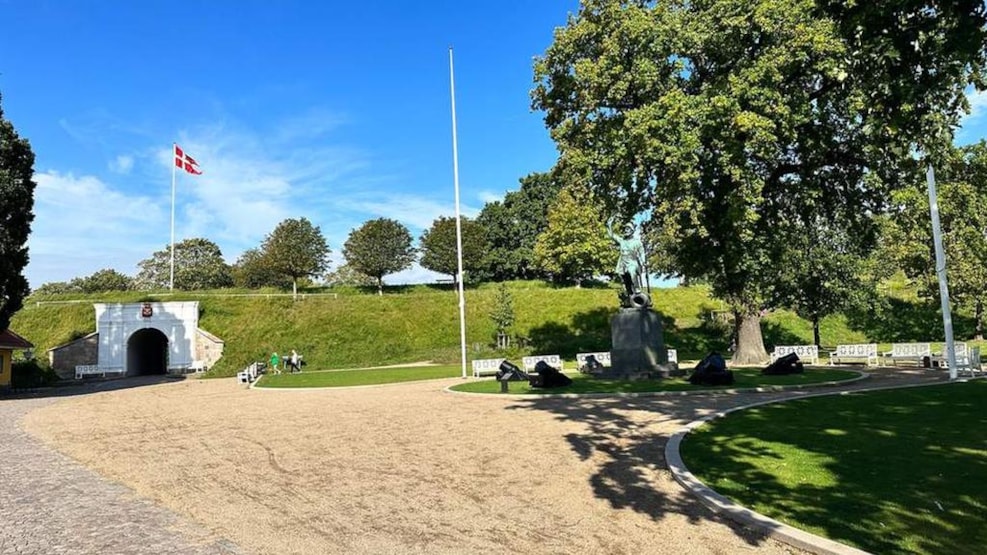
A Taste of War and Peace
May and June 1849 were tough for Fredericia's soldiers. The fortress was under siege, and outside the ramparts lay over 14,000 Schleswig-Holstein forces.
Day by day, the enemy built their defense positions, making any potential sortie from the fortress more and more difficult. In between, the Slesvig-Holsteinians bombarded the city. Supplies were scarce, and the daily ration was monotonous. Here’s for yourself:
The Daily Ration of the Common Soldier
“Each day we received 1.5 pounds* of bread or 1 pound of dry biscuits. 0.5 pounds of salted or smoked meat or pork, or 20 lod** of beef. 2/3 pægl*** of cooking peas or ¾ pægl of barley. 1.5 lod of salt. And then 0.5 pægl of spirits. 0.5 pægl. That’s hardly enough for a hollow tooth.”
*1 pound = 500 g.
**1 lod = 15.63 g.
***1 pægl = 0.24 l.
In addition to these provisions, soldiers also received 10 skilling in cash per day. They could use this to sweeten their lives by purchasing additional food and drinks from the traveling merchants who followed the army. If they wanted some cheese with their bread, it cost 5-8 skilling per pound. If they needed more spirits, it was within reach. A pot of spirits (0.966 l) cost between 8-13 skilling.*
Poul Thestrup: Mark and Skilling, Kroner and Øre. Monetary Units, Prices, and Wages in Denmark Over 350 Years (1640-1989).
But on July 6, 1849, Something Happened.
In the Cold, Clammy Night
Military logic dictated that as the attacking party, you should use three times as many soldiers as your opponent had for defense. And although, in the nights leading up to July 6, it was possible to transfer large troop forces from Funen to Fredericia under the cover of darkness, the Danish generals could only muster about 19,000 men—about half of what was deemed necessary. The generals had to think carefully. They did just that. They decided to attack at night.
The sortie began at 1 a.m. This was unheard of. Warfare at that time took place during the day. But led by General Rye, the first troops sneaked out towards the north in the middle of the night. Soon, Danish troops surged forward against the surprised Slesvig-Holsteinian soldiers. The battle lasted about three hours. The Danes emerged victorious. The significance of this victory was great. For the Danes, it made them feel invincible after the battle. But it also impacted the opponents, as the battle caused Prussia to withdraw from the war.
The victory resonated throughout Europe. Neither Germany nor England believed the story. They thought it impossible to get so many troops across the strait so quickly without the opponent realizing something.
We Have Celebrated the Day Ever Since.
The Soldiers Returned to Warm Beer and Sweet Soup
When the soldiers returned to Fredericia after the battle, the city was in an uproar. Aage Bremerholm recounts the homecoming in a memoir:
“The women were set to cook in large quantities, and the scent of oat soup and sweet soup, warm beer, and coffee wafted through the halls and corridors, indicating that something special was afoot.
With the large merchants—Ahlmann, Brøchner, Hassing, Kragh, Seidelin, and others—at the forefront, they stood ready to receive our soldiers, who all suffered from severe hunger, further increasing their pain and fatigue.
They poured spirits and steaming beer from the large buckets, which had been prudently placed along the streets up by the Prince's Gate, and the gruel and oat soup, along with mountains of sandwiches, vanished at an astonishing pace through the insatiable mouths.”
The July 6 Celebrations
Already the year after the sortie, the first July 6 commemoration was held. Flowers were laid on the still-fresh graves of the soldiers. In 1851, an honorary celebration was arranged in Fuglsang Forest, along with processions and ceremonies in churches, at graves, and in the town. This was the starting signal for the July 5-6 celebrations, which were held nationwide for the next 50 years and which Fredericia still commemorates with great traditions and cannon fire. On July 6, 1858, the statue of The Brave Land Soldier was unveiled, and it has since become a natural focal point for the events.
What Kind of Rum-General Are You?
When you come to Fredericia, you can take home a very special rum to taste the history when you get back.